- Home
- Richard Matheson
Steel: And Other Stories Page 11
Steel: And Other Stories Read online
Page 11
No, I think we can safely say that the later chroniclers, intent on substantiating the old Psalms auguries, put together the account of the crucifixion with Old Testament in lap. These Psalms, the 22nd, 31st, 38th and 69th to the fore, plus Christian imagination—made the crucifixion something—quite different from what it actually was. From what it is as I stand here.
I … oh
* * *
WHAT IS IT, PROFESSOR?
He just … spoke.
He spoke. He said—Eloi. He said God in his own language. His face is white and drawn. The lines of pain on it …
His face—it’s so … so gentle. Even now in this moment of terrible pain, he …
Undoubtedly auto-suggested hypnosis, easily effected due to his exhaustion and emotional fervor. I’m sure the poor dev—man must feel some sort of … violent ecstasy of pain. Maybe he doesn’t even feel pain at all. Perhaps his heightened body functioning, his exacerbated adrenaline flow—prevent feeling. It’s perfectly feasible. His eyes are … his—his eyes are …
ARE THERE ANY SIGNS OF NATURAL DISORDER, PROFESSOR JAIRUS?
I assume you—refer to the earthquake recorded or the dark skies or the tombs rent open or a half dozen other things spoken about in the Bible and other sources.
No, I’m afraid not.
No dark skies. The sun is still very bright and very hot. The ground is as steady as a rock. The records err slightly. Obviously the authors of the records weren’t satisfied with this and decided to add religious significance to an otherwise unreligious moment. Hand of God and all that rot.
It makes me furious, really. Isn’t the moment enough in itself? Isn’t it terrible and violent enough for … oh, the damnable pedantry of—!
* * *
PROFESSOR, ARE YOU ALL RIGHT?
What?
ARE YOU ALL RIGHT? ARE YOU FEELING ILL?
I’m … quite well. Thank you.
WHAT’S HAPPENING?
* * *
PROFESSOR?
Those eyes. Those eyes. My God, they’re so—they’re so hurt! Like a father who’s been beaten by his own children. Yet who still loves his children. Who’s been set upon by loved ones and stripped and beaten and nailed and humiliated! Is there no—
PROFESSOR.
I’m—I’m—I’m all right. I’m quite—quite all right. It’s just that … it is upsetting. This man has done nothing and—oh, my God, there’s a fly on his lips! Get off!
* * *
WHAT’S HAPPENING, PROFESSOR JAIRUS? ARE YOU—
They’re giving him a drink. He must be horribly thirsty. The sun is so hot. I’m thirsty myself.
A soldier just dipped a sponge into a pail of posca, the soldiers’ drink of vinegar and water. Now he’s put the sponge on a broken reed which was lying on the ground. He touches the sponge to the mouth of Jesus.
He … sucks the sponge. His lips tremble. It must taste horrible—bitter and warm. God, why don’t they give him a real drink—some cool water? Have they no pity for the—
PROFESSOR, YOU’D BETTER GET READY TO COME BACK NOW. YOU’VE BEEN GONE ALMOST FORTY MINUTES ALREADY. YOU’VE DONE WHAT’S TO BE DONE.
No, don’t take me back yet—not just yet. A little while. Just a little while. I’ll be all right. I swear I’ll be all right. J-just let me—stay here with him. Don’t take me, not now. Please.
PROFESSOR JAIRUS.
His eyes, his eyes—his eyes! Oh my God in heaven, they’re looking at me! He sees me! I’m sure of it! He sees me!
WE’RE BRINGING YOU BACK.
No, not yet. I’m—I must … I …
DON’T GET OUT OF THE SCREEN.
Out of the screen? Yes, maybe I can—I could …
YOU’RE COMING BACK.
No! No, I’ll break the screen if you try to bring me back! I’ll—I’ll go through it! I swear I will—don’t touch me!
PROFESSOR, STOP IT!
I’ve got to stop them! I’ve got to stop them! I’m here, I can save him! I can! Why can’t I take him into the screen with me and take him away?
JAIRUS, USE YOUR HEAD!
Why not, damn it, why not! I’m not going to stand here and let them destroy him! He’s too good, too gentle. I can save him—I can!
JAIRUS, YOU’VE DONE YOUR JOB! NOW LET HIM DO HIS!
No!
LOCK THE SCREEN.
What! What are you doing?
WE’LL HAVE TO CHANCE BRINGING HIM BACK IN THE FEW SECONDS THE SCREEN LOCK WILL HOLD.
Let me out! God help me, let me free! Stop it, you don’t know what you’re doing!
QUICKLY!
No! Stop—stop! Don’t take me! Don’t! LOOK OUT!
* * *
They dragged him, frenzied and kicking from the platform. They carried him into the office and put him down on a cot and Doctor Randall drove a syringe into his arm.
In a half hour Professor Jairus was quiet enough to swallow a glass of brandy. He sat in a big leather chair, staring straight ahead, his eyes lifeless. His mind had not returned with his body—it was still back on a lonely hill beyond Jerusalem.
There were things he could have told them; word pictures to bolster history. He could have described the clothes worn on Golgotha, the words spoken there, the moment in its bleak and brutal entirety—all this he could have told them. Told them especially that, in bringing him back so quickly, they had caused the phenomena which the Bible recorded as a quaking of earth and a renting of rocks.
None of these things did he tell them.
He told them he wanted to go home.
He put on his coat and hat and overshoes and walked into the gray murk of afternoon. His rubber covered shoes crunched in the hard packed snow, his eyes stared into the curtain of soft-falling snow.
The other things are not important, he was thinking. True or untrue they didn’t matter. The water into wine, the lepers cleansed, the sick healed, the walking on water, the return from the grave—none of them mattered. Men who sought for hope in physical miracles only were childish dreamers who could never save the world.
A man had given up his life for the things he believed in. That was miracle enough for anyone.
It was Christmas Eve and it was a lovely time to find a faith.
WHEN DAY IS DUN
Now bray goodnight to Earth
For day is dun and man’s estate
Is cast into the vault of time
Tuck in the graveclothes of forever
Snuff the candle of attempt
And let fall across our eyes
That secret shroud of fusion
With dark mystery.
He sat upon a rock and wrote his text on wood, using as pen a charcoaled finger. It is just, he mused, that the concluding theme should be set down with this digit in limbo, this beggarly palpus which once pointed at earth and sky to arrogate—I am your master, earth, your master, sky—and now lies grilled and temperate among the rubbish of our being.
I sit at Earth’s wake and shed no tear.
Now he raised funereal eyes to float across the plain a glacial contemplation. Between his fingers rolled the sooty stylus and breath showed nasal evidence of his disgust. Now here am I, he brooded, perched upon a tepid boulder and inspecting that momentous joke which man has finally played upon himself.
He smote his brow and “Ah!” he cried, spiritually swept overboard. His great despairing head flopped forward on his chest and quavering moans beset his form. Birthright disemboweled, he sorrowed, golden chance arust, man has found the way—but to extinction.
Then he straightened up to make his back a ramrod of defiance. I shall not be a cur bowwowing, he avowed. This mortuary moment shall not have the best of me. Yea, though death bestride me and plucks with spectral fingers at my sores I shall not cry for less; I am inviolate.
The tatters quivered royally upon his shoulders. He bent to write again:
Now let me relish death
As Earth gloats o’er her own demise
With eyes of
shimmering slag.
One leaden edge of tongue peeped out through barricades of lip. Now he was hot.
Birds crow a serenade to man
Incinerated he
Prostrate sauteed skeleton
For all the gods to see
Birds peck a saucy tune with bristly nibs
Upon the xylophone of man’s forgotten ribs.
“Capital! Capital!” he cried, stamping one unbooted foot upon the ashy soil. In the excitement of the phrase, he dropped his pen and stopped to pluck it up. Here, deposed antennae, he grimaced the thought, and then he wrote again.
Odd it was, he scrolled, that man throughout his ill-tuned history never ceased to plot man’s own destruction.
Chorus:
More than fantastic
This alien two
Lived together
And never knew.
He paused. How to continue, he wondered, how go on with this concluding ledger of man’s account? It demanded bite, a trenchant instantaneity and yet deceptive calm like forty fathom sea when gales are shrieking overhead. As there, so here, he thought, I must suggest the titanic with polished and well-mannered couplets. As for instance:
Tell me here
What difference there
To burn in bias
Or burn in fires.
I have no audience nor hope of one yet I go on composing till what needs be said is said. And then I go—my own way.
He reached into his pocket for the twenty-seventh time and drawing out the pistol, rolled its chamber with reflective finger. One bullet there he knew, his key to final rest. He gazed into the barrel’s dark eye and did not quail. Yes, when it ends, he thought, when I have savored to the dregs this dark wine of most utter ruination, I shall press this to my head and blow away the last of man’s complaints.
But now, he thought, back to my work. I have not done with mankind yet. A few words still remain, several discourteous racks of poesy. Shall I dispose so soon of what men always wanted most—the last word?
He flourished stylus, wrote:
Be this the final entry
In mankind’s book of psalms
He knit his shroud with atoms
And dug his grave with bombs.
No. No, that did not catch the temper. He scratched it out. Let me see, he tapped a nail upon eroded teeth. What can I say? Ah!
Man the better
Man the higher
Man the pumps
The world’s on fire.
But is this all quite fair, he mused amid chuckling, that I, as sole survivor, make such light of this unnatural tragedy which is the fall of man. Should I not instead sing out of mountainous regrets and summon tidal panegyrics which would wash away all bitterness with one great, cleansing surge. Should I not?
Man, man, he brooded, what have you done with your so excellent a world? Was it so small that you should scorn it, so drafty you should heat it to an incandescence, so unsightly you should rearrange its mountains and its seas?
“Ah,” he said, “oh … ah!”
His hands fell limp. A tear, two tears ran down his beak-shape nose to quiver on the tip, then fall upon the ground. And hiss.
What portent this, his mind groaned on, that I should be the last of Man’s embittered tribe. The very last! Portent this, vast moment this—to be alone in all the world!
It is too much, he cried aloud within his head. I reel at the significance. He fingered the gun. How can I bear to hold this crushing weight upon my shoulders? Are my words appropriate, my sentiments all fit for this immensity of meaning?
He blinked, released the pistol. He was insulted by the question. What, I not up to it; what, my words inappropriate? He straightened up and bristled at the ash-envapored sky.
It is fitting, he declared, that these last measures be composed by a man alone. For shall a pack of masons clamor round the stone, entangling arms in clumsy eagerness to chisel out man’s epitaph? And shall a host of scriveners haggle endlessly on man’s obituary, muttering and wrangling like a coachless football team in huddle?
No this is best—one man to suffer beautiful agonies, one voice to speak the final words, then dot the i’s and cross the t’s and so farewell to Man’s domain—ending, if not sustaining, in gentle poetry.
And I that man, I that voice! Blessed with this final opportunity, my words alone without a million others to dilute them, my phrases only to ring out through all eternity, uncontradicted.
He sighed, he wrote again.
It took this to make me individual
The killing of all men
Yea …
His head jerked up, alarmed, as, from far across the rubbled plain there came a sound.
“Eh?” he muttered. “What be that?”
He blinked, re-focused blood-streaked eyes, shook his head, squinted. And then his lower jaw slipped down and down until his mouth became a yawning cave.
A man was hobbling across the plain, waving a crooked arm at him. He watched the ashes rise in clouds of powder around the limping man and, in his mind, a great numbness struck.
A fellow creature! A comrade, another voice to hear, another …
The man stumbled up.
“Friend!” cried the man from out his startled face.
And abrubtly, hearing this human voice usurp the mountainous, brooding silence, something suddenly snapped within the poet’s brain.
“I shall not be robbed!” he cried. And he shot the man neatly between the eyes. Then he stepped across the peaceful body and went over to another rock of fused sidewalk.
He sat, shook back his sleeve. And, just before he bent to work again, he spun the empty chambers in his hand.
Ah, well, he sighed, for this moment, to have this glorious, shining doom alone—it was worth it.
Sonnet to a Parboiled Planet, he began …
THE SPLENDID SOURCE
Then spare me your slanders, and read this rather at night than in the daytime, and give it not to young maidens, if there be any … But I fear nothing for this book, since it is extracted from a high and splendid source, from which all that has issued has had a great success.
—Balzac: Contes Drolatiques, Prologue
It was the one Uncle Lyman told in the summer house that did it. Talbert was just coming up the path when he heard the punch line: “‘My God!’ cried the actress, ‘I thought you said sarsaparilla!’”
Guffaws exploded in the little house. Talbert stood motionless, looking through the rose trellis at the laughing guests. Inside his contour sandals his toes flexed ruminatively. He thought.
Later he took a walk around Lake Bean and watched the crystal surf fold over and observed the gliding swans and stared at the goldfish and thought.
“I’ve been thinking,” he said that night.
“No,” said Uncle Lyman, haplessly. He did not commit himself further. He waited for the blow.
Which fell.
“Dirty jokes,” said Talbert Bean III.
“I beg your pardon?” said Uncle Lyman.
“Endless tides of them covering the nation.”
“I fail,” said Uncle Lyman, “to grasp the point.” Apprehension gripped his voice.
“I find the subject fraught with witchery,” said Talbert.
“With—?”
“Consider,” said Talbert. “Every day, all through our land, men tell off-color jokes; in bars and at ball games; in theater lobbies and at places of business; on street corners and in locker rooms. At home and away, a veritable deluge of jokes.”
Talbert paused meaningfully,
“Who makes them up?” he asked.
Uncle Lyman stared at his nephew with the look of a fisherman who has just hooked a sea serpent—half awe, half revulsion.
“I’m afraid—” he began.
“I want to know the source of these jokes,” said Talbert. “Their genesis; their fountainhead.”
“Why?” asked Uncle Lyman. Weakly.
“Because it is relevant,” sai
d Talbert. “Because these jokes are a part of a culture heretofore unplumbed. Because they are an anomaly; a phenomenon ubiquitous yet unknown.”
Uncle Lyman did not speak. His pallid hands curled limply on his half-read Wall Street Journal. Behind the polished octagons of his glasses his eyes were suspended berries.
At last he sighed.
“And what part,” he inquired sadly, “am I to play in this quest?”
“We must begin,” said Talbert, “with the joke you told in the summer house this afternoon. Where did you hear it?”
“Kulpritt,” Uncle Lyman said. Andrew Kulpritt was one of the battery of lawyers employed by Bean Enterprises.
“Capital,” said Talbert. “Call him up and ask him where he heard it.”
Uncle Lyman drew the silver watch from his pocket.
“It’s nearly midnight, Talbert,” he announced.
Talbert waved away chronology.
“Now,” he said. “This is important.”
Uncle Lyman examined his nephew a moment longer. Then, with a capitulating sigh, he reached for one of Bean Mansion’s thirty-five telephones.
Talbert stood toe-flexed on a bearskin rug while Uncle Lyman dialed, waited and spoke.
“Kulpritt?” said Uncle Lyman. “Lyman Bean. Sorry to wake you but Talbert wants to know where you heard the joke about the actress who thought the director said sarsaparilla.”
Uncle Lyman listened. “I said—” he began again.
A minute later he cradled the receiver heavily.
“Prentiss,” he said.
“Call him up,” said Talbert.
“Talbert,” Uncle Lyman asked.
“Now,” said Talbert.
A long breath exuded between Uncle Lyman’s lips. Carefully, he folded his Wall Street Journal. He reached across the mahogany table and tamped out his ten-inch cigar. Sliding a weary hand beneath his smoking jacket, he withdrew his tooled leather address book.
Prentiss heard it from George Sharper, CPA Sharper heard it from Abner Ackerman, MD. Ackerman heard it from William Cozener, Prune Products. Cozener heard it from Rod Tassell, Mgr., Cyprian Club. Tassell heard it from O. Winterbottom. Winterbottom heard it from H. Alberts. Alberts heard it from D. Silver, Silver from B. Phryne, Phryne from E. Kennelly.

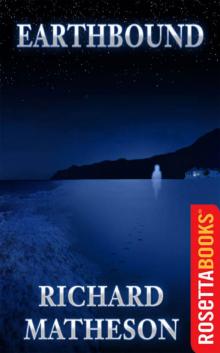 Earthbound
Earthbound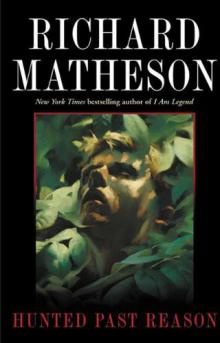 Hunted Past Reason
Hunted Past Reason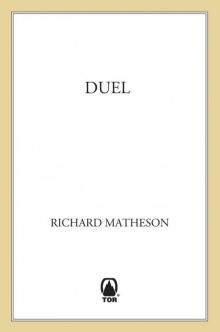 Duel: Terror Stories
Duel: Terror Stories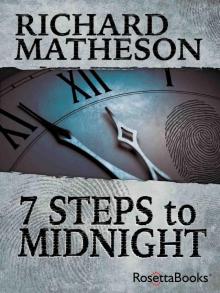 7 Steps to Midnight
7 Steps to Midnight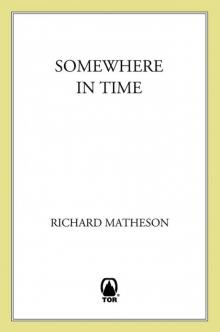 Somewhere in Time
Somewhere in Time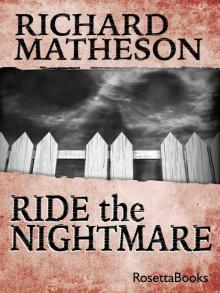 Ride the Nightmare
Ride the Nightmare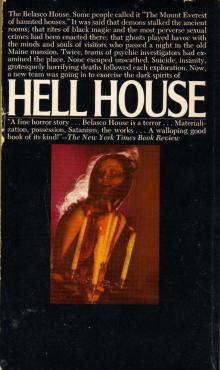 Hell House
Hell House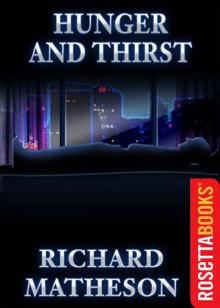 Hunger and Thirst
Hunger and Thirst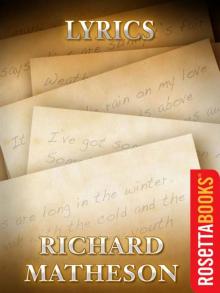 Lyrics
Lyrics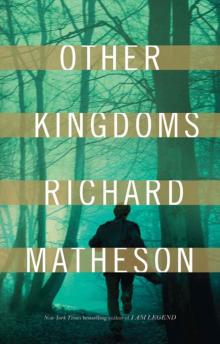 Other Kingdoms
Other Kingdoms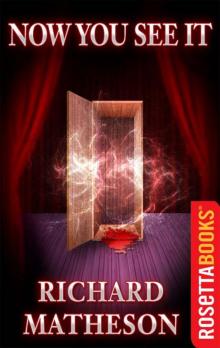 Now You See It . . .
Now You See It . . .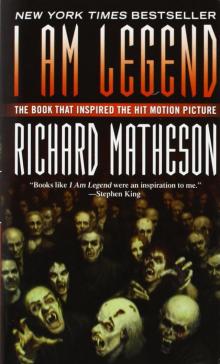 I Am Legend
I Am Legend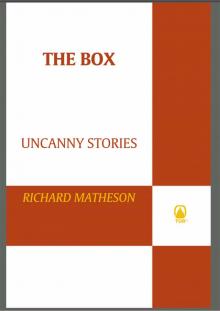 The Box: Uncanny Stories
The Box: Uncanny Stories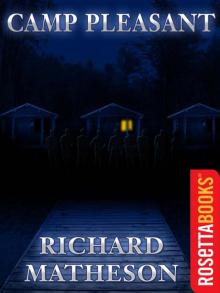 Camp Pleasant
Camp Pleasant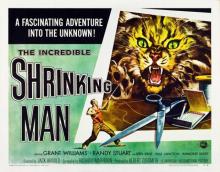 The Incredible Shrinking Man
The Incredible Shrinking Man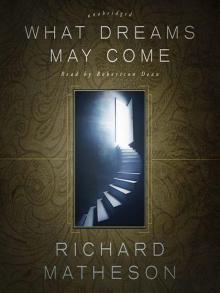 What Dreams May Come
What Dreams May Come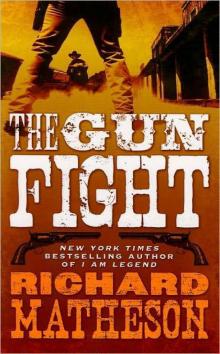 The Gun Fight
The Gun Fight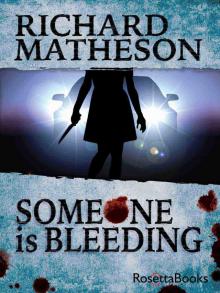 Someone Is Bleeding
Someone Is Bleeding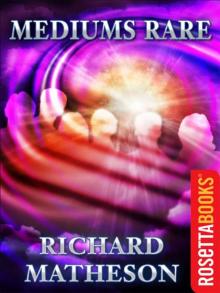 Mediums Rare
Mediums Rare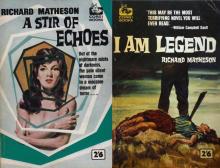 A Stir of Echoes
A Stir of Echoes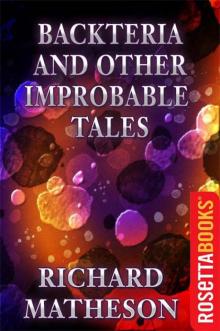 Backteria and Other Improbable Tales
Backteria and Other Improbable Tales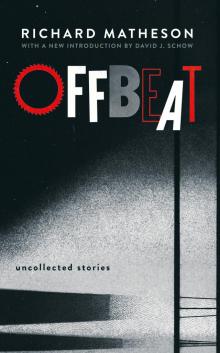 Offbeat: Uncollected Stories
Offbeat: Uncollected Stories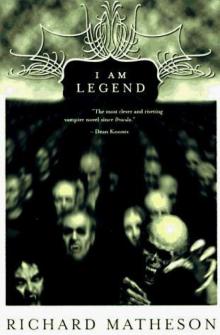 I Am Legend and Other Stories
I Am Legend and Other Stories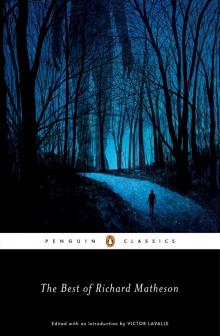 The Best of Richard Matheson
The Best of Richard Matheson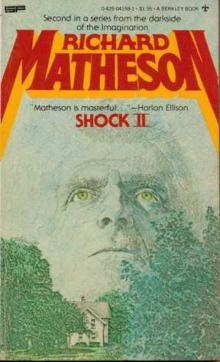 Shock II
Shock II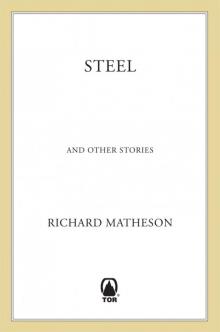 Steel: And Other Stories
Steel: And Other Stories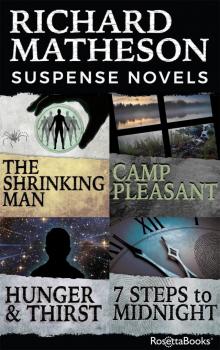 Richard Matheson Suspense Novels
Richard Matheson Suspense Novels The Link
The Link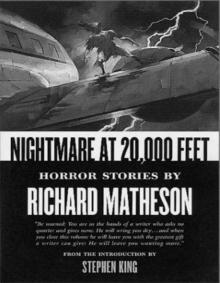 Nightmare At 20,000 Feet
Nightmare At 20,000 Feet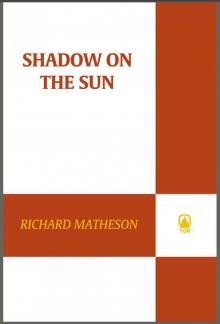 Shadow on the Sun
Shadow on the Sun![Steel and other stories [SSC] Read online](http://i1.bookreadfree.com/i/03/21/steel_and_other_stories_ssc_preview.jpg) Steel and other stories [SSC]
Steel and other stories [SSC]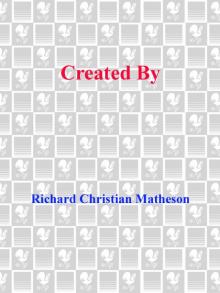 Created By
Created By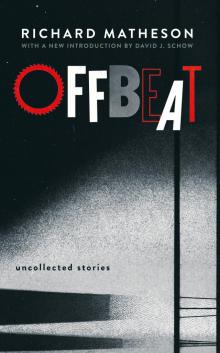 Offbeat
Offbeat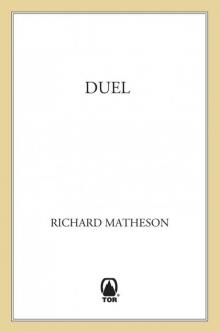 Duel
Duel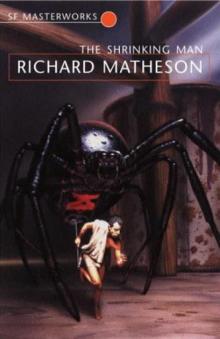 The Shrinking Man
The Shrinking Man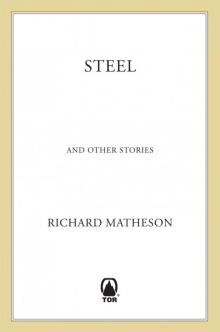 Steel
Steel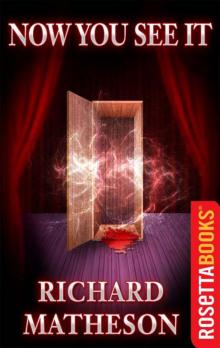 Now You See It
Now You See It